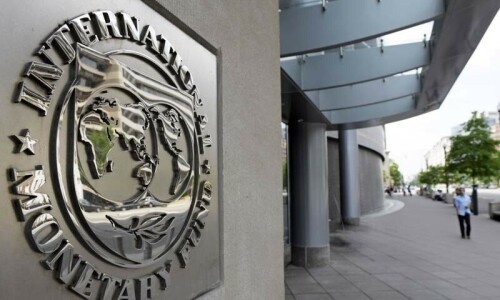
ASTANA: Veteran Kazakh leader Nursultan Nazarbayev won Sunday's early presidential election with an overwhelming 95.5 per cent of the vote, the Central Election Commission said on Monday, citing first official results.
By winning an election devoid of any challenge, Nazarbayev has secured another five years in charge of his oil-producing Central Asian state of 16.4 million people, where the echo of popular revolutions in the Arab world is almost inaudible.
“You've given me carte blanche to continue the course of economic, political and social reforms,” Nazarbayev said in an address to his compatriots when he visited the headquarters of his Nur Otan ruling party early this morning.
Nazarbayev, 70, has made stability his main motto in the predominantly Muslim nation, where he has overseen market reforms and more than $120 billion in foreign investment during more than two decades in power.
But he is challenged by critics at home and rapped by the West for his authoritarian methods. Kazakhstan has never held an election judged free or fair by international monitors.
The Organisation for Security and Cooperation in Europe (OSCE), chaired last year by Kazakhstan, has stationed more than 300 observers across the country and identified pre-election concerns about transparency of the vote and media freedom.
Its election monitoring arm will deliver its findings later on Monday.
Succession?
Nazarbayev's landslide re-election does nothing to answer the question cited by many investors as the biggest political risk in Kazakhstan: who will eventually succeed him?
“There should be no implications for the investment universe following the elections,” said Milena Ivanova-Venturini, deputy head of global research at investment bank Renaissance Capital.
“The question of succession remains the wild card and the largest single risk to investments in Kazakhstan in the mid to long term.”
The president, who has built warm ties with giant neighbours Russia and China, has said he will rule for as long as his health and his people will allow. Some analysts say he could use his next five years in office to groom a pliant successor.
In the previous polls in 2005, Nazarbayev won 91.2 per cent of the vote.
“It is well understood that you win an election not on the day of this election, but much earlier — through your deeds,” Nazarbayev said in comments posted on his official website, www.akorda.kz.
“This means that whatever we have been doing these 20 years has not been in vain. This is...an exam that we all have passed.”
Living standards in Kazakhstan are higher than elsewhere in Central Asia, a volatile region bordering Afghanistan unsettled by poverty, ethnic tensions, radical Islam and the drug trade.
Official turnout was 89.9 per cent in Sunday's election, which Nazarbayev called almost two years before his term had been due to end after rejecting a proposal for a referendum to extend his reign unchallenged until 2020.
The fragmented opposition, which was left no with time to mobilise its forces, denounced the early election as a farce.
One of the three candidates who nominally stood against Nazarbayev voted for the president.










































Dear visitor, the comments section is undergoing an overhaul and will return soon.